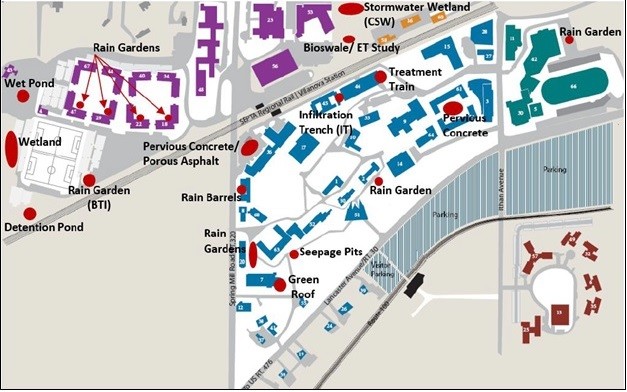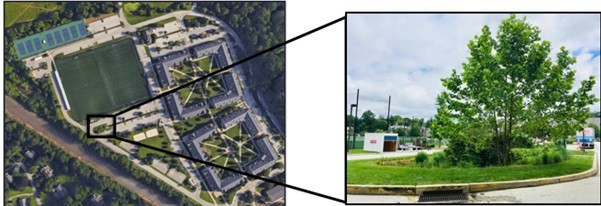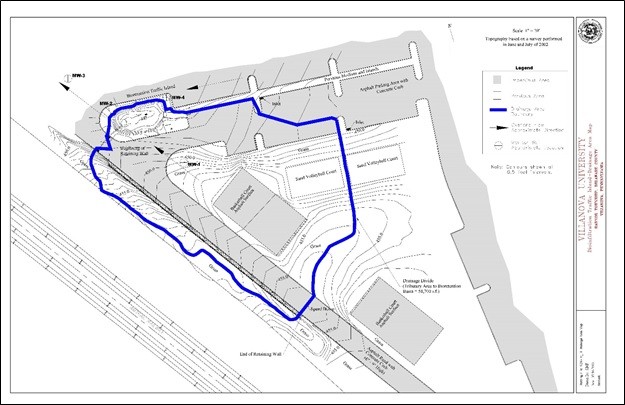BIO-INFILTRATION TRAFFIC ISLAND
The Bio-Infiltration Traffic Island (BTI) is a rain garden retrofitted off a traffic island, which is situated in the West Campus of Villanova University. It is the one of the oldest rain gardens in the country and was designed by Dr. Robert Traver. Funded by the PADEP Growing Greener Program and the Villanova University, the rain garden was constructed in 2001 and has been monitored since 2003. The BTI rain garden can be seen on the left side of the map in the following figure.

Figure 1: Stormwater Control Measures on the Villanova University Campus

Figure 2: Location of the BTI in the west campus (left) and BTI with the outflow inlet (right)
The BTI was designed to reduce downstream stormwater volumes, stream bank erosion and nonpoint source pollution to the headwaters of the Darby Creek. During larger storm events (2 – 100 year storms) a significant portion of the rainfall, as well as the first flush of pollutants is infiltrated. Flows over the capacity of the BTI go through the original culvert system to a dry detention pond.
The drainage area for the BTI consists of 1.3 acres of parking lot, grass and recreational area, with the impervious cover contributing to 52% of the drainage area. The traffic island was retrofitted into the shape of a shallow bowl to facilitate the accumulation of runoff within the rain garden.

Figure 3: Drainage area contributing runoff to the BTI

Figure 4: Schematic of the BTI during a storm event
The BTI, like most of the stormwater control measures, aims to facilitate natural processes such as infiltration and evapotranspiration to reduce the stormwater volumes reaching Darby Creek. Megan Farnsworth, a recent graduate from the Villanova University studied that the vegetation present at the BTI plays a huge part in reducing the amount of runoff that enters the rain garden. She also noted that analyzing the different aspects of the hydrological cycle within the BTI would provide a better understanding of the fate of the stormwater within a Stormwater Control Measure. The water quality tests done at the rain garden since 2003 provide crucial data on the quality of the water entering and exiting the rain garden and the influence of natural treatment on the water exiting the raingarden.
VCRWS NEWS
Chenfeng Xiong, PhD, Virginia Smith, PhD, and Peleg Kremer, PhD, with support from Bridget Wadzuk, PhD, have been awarded $750,000 of a $2 million research grant by the National Science Foundation (NSF) for a project designed to reduce the vulnerability of underserved communities to the social and environmental impacts of urban flooding events.
Dr. Bridget Wadzuk Receives 2024 Outstanding Faculty Research Award
The professor of Civil Engineering and director of Sustainable Engineering was recognized for her work in water resources engineering and green stormwater infrastructure, most notably her research on the evapotranspiration process from green roofs and bioretention.
Villanova researchers say rain gardens can be an effective tool for managing stormwater
The school's rain gardens have proven effective at helping prevent raw sewage from overflowing into waterways.
Courtesy of whyy.org



